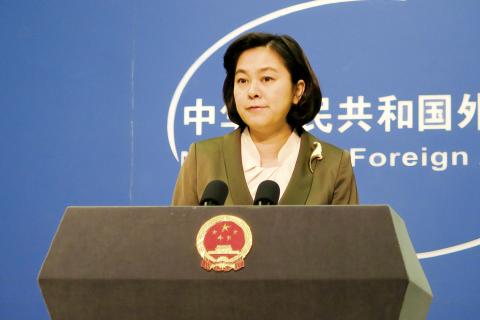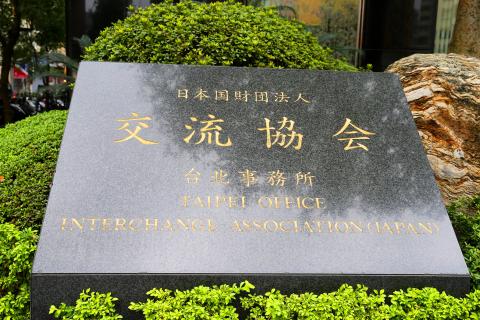The Ministry of Foreign Affairs yesterday expressed support for the planned renaming of the Interchange Association, Japan to the Japan-Taiwan Exchange Association from Sunday.
The association represents Japan’s interests in Taiwan in the absence of bilateral diplomatic ties, which ended in 1972. Taiwan also set up a de facto embassy with an ambiguous title in Tokyo, called the Association of East Asian Relations, which was renamed the Taipei Economic and Cultural Representative Office in Japan in 1992.
The ministry said that the new name reflects the business activities carried out by the association and is a positive development in Taiwan-Japan relations.

Photo: CNA
Saying that the two nations have become closer in recent years, the ministry added that Japan is Taiwan’s third-largest trade partner, while Taiwan is Japan’s fourth-largest. Bilateral trade totaled US$57.9 billion last year.
In addition, there were 5.3 million travelers between Taiwan and Japan last year and that number could surpass 6 million this year, the ministry said.
Taiwan and Japan share the universal values of democratic governance, freedom and the rule of law, with various public opinion polls showing the close and friendly relations between Taiwanese and Japanese, the ministry said, while expressing the hope that the two will continue to expand and deepen mutually beneficial cooperation.

Photo: CNA
The move could represent the greatest breakthrough since the foundation was established in 1972 after official diplomatic ties between the two nations were severed, and is expected to further Taiwan-Japan relations.
Former leader Chiang Kai-shek’s (蔣介石) administration proposed that the Japan-based association be named the Japan-China Interchange Foundation, which Tokyo rejected, anonymous sources said.
Like its Taiwanese counterpart, the then-Association of East Asian Relations, their vague appellations caused bafflement as to what their purposes were.
The sources said that the timing of the name change was because “times have changed,” which has manifested itself in several ways.
“In the 1980s and 1990s, there were not many substantial exchanges between Japan and Taiwan, but the total number of tourists visiting both nations has surpassed 6 million in recent years, and exchanges have been plentiful on a wide range of issues,” the sources said.
A recent survey by the Japanese government found that only 10 percent of Taiwanese respondents said they knew what “the functions of the Interchange Association, Japan, were, while 80 percent said the opposite, the sources said.
Association officials did not confirm if the name change signals a deepening of Taipei-Tokyo relations, but dismissed speculation that the move was inspired by US president-elect Donald Trump’s perceived stance on Taiwan, saying that it was planned, a source said.
A Japanese official said that it was “Taiwan’s business” if it changes the name of the Taipei Economic and Cultural Representative Office in Japan to the Taiwan Economic and Cultural Representative Office in Japan, but added that the potential political implications should be assessed before a change is made, the source said.
Japanese officials said that Taiwan submitted a request to change the representative office title during former representative to Japan Koh Se-kai’s (許世楷) term between 2004 and 2008, adding that the ministry has never made such a request.
“China remains firm and consistent on issues regarding Taiwan affairs. We strongly oppose any attempts at creating the frameworks of ‘one China, one Taiwan’ or ‘two China’s.’ We express our strong protest against Japan’s passive stance over Taiwan affairs,” Chinese Ministry of Foreign Affairs spokeswoman Hua Chunying (華春瑩) said at a news conference in Beijing in response to the proposed name change.
“China urges Japan to adhere to the principles set forth in the Japan-China Joint Communique and honor the promises it has made to China, uphold the ‘one China’ principle and refrain from sending false signals to Taiwan and the international community, thereby causing new problems to China-Japan relations,” she said.
China has initiated negotiations with Japan over the issue, she said.

US President Donald Trump yesterday announced sweeping "reciprocal tariffs" on US trading partners, including a 32 percent tax on goods from Taiwan that is set to take effect on Wednesday. At a Rose Garden event, Trump declared a 10 percent baseline tax on imports from all countries, with the White House saying it would take effect on Saturday. Countries with larger trade surpluses with the US would face higher duties beginning on Wednesday, including Taiwan (32 percent), China (34 percent), Japan (24 percent), South Korea (25 percent), Vietnam (46 percent) and Thailand (36 percent). Canada and Mexico, the two largest US trading

AIR SUPPORT: The Ministry of National Defense thanked the US for the delivery, adding that it was an indicator of the White House’s commitment to the Taiwan Relations Act Deputy Minister of National Defense Po Horng-huei (柏鴻輝) and Representative to the US Alexander Yui on Friday attended a delivery ceremony for the first of Taiwan’s long-awaited 66 F-16C/D Block 70 jets at a Lockheed Martin Corp factory in Greenville, South Carolina. “We are so proud to be the global home of the F-16 and to support Taiwan’s air defense capabilities,” US Representative William Timmons wrote on X, alongside a photograph of Taiwanese and US officials at the event. The F-16C/D Block 70 jets Taiwan ordered have the same capabilities as aircraft that had been upgraded to F-16Vs. The batch of Lockheed Martin

GRIDLOCK: The National Fire Agency’s Special Search and Rescue team is on standby to travel to the countries to help out with the rescue effort A powerful earthquake rocked Myanmar and neighboring Thailand yesterday, killing at least three people in Bangkok and burying dozens when a high-rise building under construction collapsed. Footage shared on social media from Myanmar’s second-largest city showed widespread destruction, raising fears that many were trapped under the rubble or killed. The magnitude 7.7 earthquake, with an epicenter near Mandalay in Myanmar, struck at midday and was followed by a strong magnitude 6.4 aftershock. The extent of death, injury and destruction — especially in Myanmar, which is embroiled in a civil war and where information is tightly controlled at the best of times —

China's military today said it began joint army, navy and rocket force exercises around Taiwan to "serve as a stern warning and powerful deterrent against Taiwanese independence," calling President William Lai (賴清德) a "parasite." The exercises come after Lai called Beijing a "foreign hostile force" last month. More than 10 Chinese military ships approached close to Taiwan's 24 nautical mile (44.4km) contiguous zone this morning and Taiwan sent its own warships to respond, two senior Taiwanese officials said. Taiwan has not yet detected any live fire by the Chinese military so far, one of the officials said. The drills took place after US Secretary